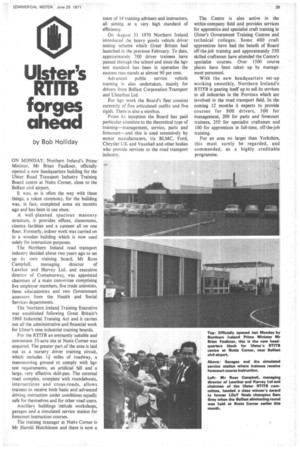Ulster's RTITB forges ahead
Page 41

If you've noticed an error in this article please click here to report it so we can fix it.
by Bob Holliday
ON MONDAY, Northern Ireland's Prime Minister, Mr Brian Faulkner, officially opened a new headquarters building for the Ulster Road Transport Industry Training Board centre at Nutts Corner, close to the Belfast civil airport.
It was, as is often the way with these things, a token ceremony, for the building was, in fact, completed some six months ago and has been in use since.
A well-planned spacious masonry structure, it provides offices, classrooms, cinema facilities and a canteen all on one floor. Formerly, indoor work was carried on in a wooden building which is now used solely for instruction purposes.
The Northern Ireland road transport industry decided about two years ago to set up its own training board. Mr Ross Campbell, managing director of Lawther and Harvey Ltd. and executive director of Containerway, was appointed chairman of a main committee comprising five employer members, five trade unionists, three educationists and two Government assessors from the Health and Social Services departments.
The Northern Ireland Training Executive was established following Great Britain's 1968 Industrial Training Act and it carries out all the administrative and financial work for Ulster's nine industrial training boards.
For the RTITB an eminently suitable and convenient 33-acre site at Nutts Corner was acquired. The greater part of the area is laid out as a nursery driver training circuit, which includes 14 miles of roadway, a manoeuvring ground to comply with hgv test requirements, an artificial hill and a large, very effective skid-pan. The external road complex, complete with roundabouts, intersections and cross-roads, allows trainees to receive both basic and advanced driving instruction under conditions equally safe for themselves and for other road users.
Ancillary buildings intlude workshops, garages and a simulated service station for forecourt instruction courses.
The training manager at Nutts Corner is Mr Harold Hutchinson and there is now a team of 14 training advisers and instructors, all aiming at a very high standard of efficiency.
On August 31 1970 Northern Ireland introduced the heavy goods vehicle driver testing scheme which Great Britain had launched in the previous February. To date, approximately 700 driver trainees have passed through the school and since the hgv test standard has been in operation the success rate stands at almost 90 per cent.
Advanced public service vehicle training is also undertaken, mainly for drivers from Belfast Corporation Transport and Ulsterbus Ltd.
For hgv work the Board's fleet consists currently of five articulated outfits and five rigids. There is also a minibus.
From its inception the Board has paid particular attention to the theoretical type of training—management, service, parts and forecourt—and this is used extensively by motor manufacturers, viz BLMC, Ford, Chrysler UK and Vauxhall and other bodies who provide services to the road transport industry. The Centre is also active in the within-company field and provides services for apprentice and specialist craft training in Ulster's Government Training Centres and technical colleges. Some 400 craft apprentices have had the benefit of Board off-the-job training and approximately 550 skilled craftsmen have attended the Centre's specialist courses. Over 1500 course places have been taken up by management personnel.
With the new headquarters set-up working smoothly, Northern Ireland's RTITB is gearing itself up to sell its services to all industries in the Province which are involved in the road transport field. In the coming 12 months it expects to provide courses for 800 drivers, 590 for management, 200 for parts and forecourt trainees, 250 for specialist craftsmen and 180 for apprentices in full-time, off-the-job training.
For an area no larger than Yorkshire, this must surely be regarded, and commended, as a highly creditable programme.




































































































